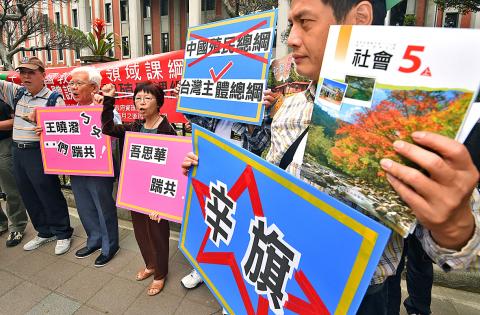In the latest of a series of protests against the high-school curriculum for Chinese language and social science, dozens of civic group representatives yesterday called for Taiwanese to demand the President Ma Ying-jeou (馬英九) administration reverse the policy aimed at “brainwashing” the younger generation.
“Taiwan yes, China no,” protesters shouted outside the Ministry of Education building, which has appealed against the ruling handed down by Taipei High Administration in February that threw into doubt the legitimacy of the ministry’s revisions to the curriculum guidelines in January last year.
The protesters put on a skit to show their dissatisfaction of the weight accorded to the 228 Massacre and the White Terror era in the new version of the curriculum, waving a banner reading: “Taiwanese independence.”

Photo: Liao Chen-huei, Taipei Times
“New curriculum guidelines should be able to stress Taiwan-centered values,” Alliance for Curriculum Guidelines based on Taiwan Subjectivity spokesperson Kuo Yan-lin (郭燕霖) said.
The alliance demanded that Minister of Education Wu Se-hwa (吳思華) push back the date of implementing new curriculum guidelines to June next year and replace “pro-unification academics” on the committee in charge of curriculum review, citing history professor and Cross-Strait Peace and Development Union member Sun Juo-yi (孫若怡).
“There are people who still consider themselves ‘Chinese’ even after living in Taiwan for so long. Less than 3 percent of the nation’s population hold great power that enable them to impose their views on the other 97 percent of Taiwanese,” Taiwan National Party Convener Ted Lau (劉重義) said.
All Taiwanese should fight against the curriculum guidelines attempting to brainwash young people, Lau said.
Alliance of Referendum for Taiwan secretary-general Lee Chuan-hsin (李川信) disputed the ministry’s statement that the revisions made to the guidelines complied with the Republic of China (ROC) Constitution.
The ROC Constitution forced upon Taiwanese by the Chinese Nationalist Party (KMT) regime when it fled to Taiwan in 1949 treated Taiwan as a subordinate under the “one China” framework, Lee said.
“Only by holding a referendum to have the ROC Constitution abolished can problems be resolved,” Lee added.
Taiwan Romanization Association member Wu Li-hui (吳麗慧) said the Ma administration is determined to accomplish its “de-Taiwanization” mission by implementing the new curriculum guidelines and guidelines for other subjects before Ma leaves office in May next year.
The 13 cities and counties governed by the Democratic Progressive Party are considering refusing to adopt the revised curriculum guidelines, while the Taipei City Government, led by Taipei Mayor Ko Wen-je (柯文哲), said that it plans to use the unadjusted curriculum until the ministry resolves the controversy.
Taiwan Independence Reformation Association member Lai Fang-cheng (賴芳徵) called for more students and parents to speak out against the new curriculum guidelines.
Additional reporting by Shih Hsiu-chuan

Alain Robert, known as the "French Spider-Man," praised Alex Honnold as exceptionally well-prepared after the US climber completed a free solo ascent of Taipei 101 yesterday. Robert said Honnold's ascent of the 508m-tall skyscraper in just more than one-and-a-half hours without using safety ropes or equipment was a remarkable achievement. "This is my life," he said in an interview conducted in French, adding that he liked the feeling of being "on the edge of danger." The 63-year-old Frenchman climbed Taipei 101 using ropes in December 2004, taking about four hours to reach the top. On a one-to-10 scale of difficulty, Robert said Taipei 101

Nipah virus infection is to be officially listed as a category 5 notifiable infectious disease in Taiwan in March, while clinical treatment guidelines are being formulated, the Centers for Disease Control (CDC) said yesterday. With Nipah infections being reported in other countries and considering its relatively high fatality rate, the centers on Jan. 16 announced that it would be listed as a notifiable infectious disease to bolster the nation’s systematic early warning system and increase public awareness, the CDC said. Bangladesh reported four fatal cases last year in separate districts, with three linked to raw date palm sap consumption, CDC Epidemic Intelligence

US climber Alex Honnold left Taiwan this morning a day after completing a free-solo ascent of Taipei 101, a feat that drew cheers from onlookers and gained widespread international attention. Honnold yesterday scaled the 101-story skyscraper without a rope or safety harness. The climb — the highest urban free-solo ascent ever attempted — took just more than 90 minutes and was streamed live on Netflix. It was covered by major international news outlets including CNN, the New York Times, the Guardian and the Wall Street Journal. As Honnold prepared to leave Taiwan today, he attracted a crowd when he and his wife, Sanni,

Taiwanese and US defense groups are collaborating to introduce deployable, semi-autonomous manufacturing systems for drones and components in a boost to the nation’s supply chain resilience. Taiwan’s G-Tech Optroelectronics Corp subsidiary GTOC and the US’ Aerkomm Inc on Friday announced an agreement with fellow US-based Firestorm Lab to adopt the latter’s xCell, a technology featuring 3D printers fitted in 6.1m container units. The systems enable aerial platforms and parts to be produced in high volumes from dispersed nodes capable of rapid redeployment, to minimize the risk of enemy strikes and to meet field requirements, they said. Firestorm chief technology officer Ian Muceus said